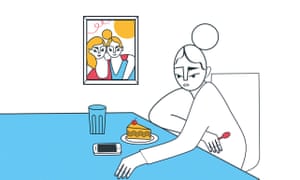For growing numbers of people the weekend is an emotional wilderness where interaction is minimal and social life non-existent. What can be done to break this toxic cycle asks Paula Cocozza in The Guardian?

On Saturday morning, Peter got up and went to the supermarket. He carried his shopping home, and took care of his laundry and ironing. In the afternoon, he browsed a few record stores and later he cooked himself dinner; always something adventurous on a Saturday night. Afterwards, he hit Netflix. And in all those hours, in common with many of Peter’s Saturdays, not to mention his Sundays, he had no meaningful interaction with another human being. “The only person I spoke to,” he says, “was the lady who came over to verify my bottles of beer at the supermarket self-checkout.”
During the week, Peter, 62, is too busy to be lonely. His commute from Brighton to London means that his working life is “a tunnel” he enters on a Monday and from which no daylight is glimpsed until Friday. But just when Peter re-emerges, he is stymied by an overwhelming sense of loneliness. Instead of providing respite from the stress of office life, a chance to reconnect with family and friends, the weekend looms as a vast emotional and social wilderness that must be traversed before work takes hold again.

Get Society Weekly: our newsletter for public service professionals
Read more
Peter dreads the weekend. But he is far from alone in this. He is one of nearly 200 respondents, from Falmouth to Jakarta, who replied to a request on the Guardian’s website for readers to share their experience of weekend loneliness. The youngest respondent was 16; the eldest in her 70s, and between them, the pain and isolation recurred in countless iterations.
Despite all this, the phenomenon of weekend loneliness has scarcely been studied. “It’s not something that’s been researched at all,” says Pamela Qualter, professor of psychology for education at the University of Manchester. She led the BBC’s Loneliness Experiment last year, and “found that there didn’t seem to be a time of day [nor] a season when people felt especially lonely. But we didn’t ask about the weekend.” So what does weekend loneliness look like, who experiences it – and what might be done to alleviate it?
“We define loneliness as the difference between the desire or expectation of what life should be like, and the reality,” says Kellie Payne, research and policy manager at the Campaign to End Loneliness. For those who experience loneliness primarily – or only – at the weekend, this painful discrepancy is intensified by the sense of being at odds not only with the world outside the door, but with one’s capable, sociable weekday self.
A personal, internal division emerges. Liz is 41, with a rewarding job and family nearby – but she is living two lives. “In the week, I am a contented, fulfilled person. At the weekend, I feel like a lonely outcast,” she says. Increasingly, she finds herself out of step with her social group where she lives in Somerset. She runs her own training business from home, so weekdays are busy. But this is exactly when her married friends want to meet for coffee “and a moan about their husbands”.
Liz would like to see these friends at the weekend, too, but when Saturday comes, “it’s unsaid – but it’s like they’ve closed the doors to me. Weekends are for couples. It would be unheard of to invite me to a dinner party, because I’m single,” she says. “I wake up on a Saturday and feel down. It’s a struggle to pull myself out of bed if I have nothing planned.” When Monday dawns, “it is always a relief”.
For Liz, the loneliness of the weekend is exacerbated by an additional, painful sense that she is not only alone but locked out – “banned from the weekend”, as she puts it. Between Monday and Friday, she enjoys her neighbourhood, but at the weekend, the streets and parks seem to transform. They become questioning, forbidding, to the extent that Liz wonders if she has “absorbed” her loneliness from her environment, now full of couples, families, groups.
“What’s interesting to me is that I’ll sit on my own in a cafe easily in the week,” she says. But the same cafe at the weekend is a space she cannot enter. Even walking the dog takes on a different cast. “I don’t feel conscious at all during the week” – but on a Sunday morning, the same walk feels acutely sad.
“As psychologists we talk about the looking-glass self,” Qualter says. “How your feelings about yourself are influenced by how you think others see you. The public space changes, becomes occupied by other people … It’s no longer your space. You feel uncomfortable because you don’t fit.”
“I hear this a lot,” says Sally Brown, a life coach and counsellor. “It’s like people have two personas. The weekday persona is busy and confident. But the weekend persona is lost and vulnerable.”
But is Liz really projecting her loneliness on to others, and imagining the way they see her – or does society read people who are alone in too predictable a manner? Peter believes he passes through his Brighton weekends undisturbed because he is regarded as a harmless eccentric. “The bachelor is something of a social misfit, but an acceptable one,” he remarks.
A person who enters a public space alone will often be read as best left alone. Mark is 32 and recently returned to London after a couple of years travelling. Going to the pub to watch football one weekend, he took a seat at an empty table for six. Quickly the pub filled. But Mark sat alone and undisturbed for 20 minutes before anyone asked if they could take one of the five free seats around him. “I guess they think you are going to be bringing extra people, or you’re weird,” he says wryly.
Brown, who sees many clients in their 30s and 40s, thinks this disconnect is “related to those transitional times when your peer group may have moved on to a stage you haven’t yet reached”. And, of course, may not wish to reach. Mark’s friends, like Liz’s, are mostly in relationships. “It can happen really fast. All of a sudden, your group isn’t there any more. You are second-tier friendship, relegated to week nights. You’re not in the couples’ dinner party or playdate scene. You start to lack confidence in connecting, so hesitate to suggest things. You assume you are not welcome at the weekend and withdraw … It becomes a toxic circle.”
Brown’s belief that loneliness at the weekend arises out of life’s transitions resonates with Kate. At 61, hers is a different kind of shift to Mark’s or Liz’s. Kate sees herself moving “from motherhood to single life again”. She uses the word “transition”, especially when she reminds herself, while she sits alone on Saturday nights, that she has raised her girls well, that the loneliness is just another challenge to overcome.
Kate, who lives in Cardiff, has two grown daughters whom she raised alone. Her weeks are busy with work and friends, and sometimes her children, if they happen to be nearby. But her weekends, like Peter’s, are “very long and quiet … I will not use my voice or speak with another human until Monday.”
For Kate, the silence of the weekend is wrapped in another sort of silence. She cannot speak of her loneliness to anyone, least of all her children.
“They would be devastated,” she says. “In a way, promoting their education, encouraging them to be social and confident … That has been to the detriment of me. The more they achieve, the further from home they have moved. But I wouldn’t change it, because it was my duty as a mother.”
Seven times during the course of an hour-and-a-half’s conversation, Kate worries that sharing her loneliness with her children would “burden” them. The word feels heavier each time it lands.
While silence protects her daughters, and preserves their sense of Kate, and Kate’s sense of herself, as “strong and capable, someone they can talk to”, it compounds her remoteness. Although she exchanges WhatsApp messages with both children every weekend, these seem to make no impact on Kate’s underlying isolation.

FacebookTwitterPinterest ‘The idea of being retired is horrific – then all days will be like weekends.’ Illustration: Monika Jurczyk/The Guardian
She has a “wonderful relationship” with both daughters, but their closeness makes the pain worse – because how can they not see?
I wonder if Kate’s daughters ever ask her what she did at the weekend, and Kate says she has been wondering about this, too. They don’t. “At some level – not consciously – they are worried about the answer.” In the meantime, her children’s absence weighs “like a bereavement” and the loneliness hits hardest at certain predictable moments.
Just as Peter sits down to his adventurous dinner, picks up his cutlery and feels instantly lonely – despite his efforts in the kitchen – so Kate reels from her plate.
She is at the opposite end of the culinary spectrum to Peter. “One of my favourite go-to meals is a couple of boiled eggs and a piece of toast,” she says. It’s a classic comfort meal that Kate routinely enjoys. But last weekend, she sat down, cracked open the egg, “and I thought: ‘I can’t do it.’ I have had that meal so many times, I just couldn’t eat it.” She threw the food into the bin.
Kate is approaching retirement. “But the idea of being retired is horrific – because all the days will be like weekends.” So what can she, or anyone, do to try to stem their weekend loneliness?
Sarah, who is 44 and lives in Surrey, asks herself this very question. “What can you do to alleviate your loneliness? We’re all struggling. Everyone I know has less money to spend.” She, too, is a single parent; and as her daughter, 18, becomes more independent, Sarah feels increasingly lonely at weekends. “What exacerbates the loneliness is that I’m a very sociable person,” she says.
To counter this, she keeps herself in a state of perpetual readiness for last-minute invitations. “It’s good to be seen as someone who will say yes – because you get asked again. I’ve been very lucky to be an emergency plus-one in quite a few situations,” Sarah says. She is aware that this won’t sound lucky to everyone.
She has filled in for her best friend on a trip with her friend’s husband to Secret Cinema. And she has made up the numbers at a wedding. “There is a kind of currency to being a couple,” she says. “That’s the word I want to use – a currency that makes couples worth more in social situations.” (Conversely, of course, the cost of living is lower for them, too.) So does being available at the last minute represent a kind of personal devaluation?
“I think that’s fair to say,” she says. “I’d much rather be turning up with someone. But I really appreciate it when I’m included. I love it. I think it’s important to be the person who says: ‘Yes, sure, I can sit next to whoever.’”
Sarah and I are speaking on a Saturday afternoon. If she were not talking to me, she says, she would be writing an email or doing housework. She has a natural positivity and a bright voice that belie the sadness she feels on her most solitary weekends. If her daughter goes to university next year, the weekends, and weekdays, will further quieten. Like Kate and Peter, Sarah is conscious of the life change that looms.
So she is quietly hatching plans – to move, maybe, depending on her daughter’s movements. And in the meantime, she offers to babysit for friends, hopes for a leisure revolution for single people, and says yes to as many invitations as possible.
“It comes down to keeping the communication lines open, and initiating,” Brown, the life coach, says. Some of her clients have resolved their divided lives by adding structure to their weekends. Loneliness creates passivity in friendships, Brown warns. “There is a sense of ‘I can’t make this happen … It has got to happen to me’”, which can make people who are lonely less inclined to make an effort.
With some clients, Brown has mapped on paper their social circles and groups. “It’s amazing how many people they come up with.” Others’ “proactive approach” include cultivating regular haunts (because being among fellow regulars can feel a bit like being among friends) and attending groups or clubs through the website Meetup.
“That journey can involve some extra loneliness if you find a group you don’t fit with,” Brown warns. I think of Peter, who dropped out of a walking group after a woman berated him for describing himself as “a sad old bachelor”. (“You mustn’t say that,” she told him. “You must say you’re alone and happy.”) Or Kate, waiting for her children to ask what she did at the weekend. Or Mark, who sometimes finds Meetups “a group of lonely, desperate guys”.
“It’s about keeping going,” Brown advises. “If after two weeks you’re not connecting, move on.” Loneliness is complex, she notes. “It can impact those who crave time to themselves after a week at work”; a double bind in which company is both a salve and an impediment.
Peter, for instance, used to volunteer, but, he says, “it cut into what little weekend time I had”, which makes me suspect that as well as hankering for connection, he also cherishes his time alone. “People talk about the difference between being alone and being lonely,” he says. “I am slap bang in the middle of that.”
Meanwhile, Kate is thinking of fostering children. When Peter retires, he might travel the UK and explore a new culinary continent: veganism. Liz has been broadening her group of friends, “meeting new people who aren’t so stuck in the couple thing”. Mark is considering a move to a livelier part of London. And Sarah reminds herself, on her loneliest Saturday evenings, when no last-minute invitations materialise, “to look at all the positives. It’s really hard, but try to embrace the aloneness, the solitude.”